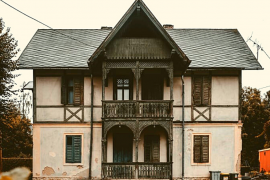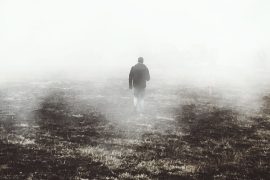Translated from Spanish by Allison A. deFreese
Code name: Margueritte
With short strokes, the man moves his arms to float in the brown water. The current can carry him away, so he paddles a little to stay in the same place. He submerges his face up to the nose and swallows a little of the river. This stretch of river is his as far as the eye can see from his house, a structure elevated on stilts. The man must move his arms more vigorously to stay on his property, so that the body of sweet water doesn’t pull him onto his neighbor’s land. He considers for a moment the idea of ownership but soon gives up, telling himself he is no one.
The summer heat brought insects; they drift on the water hyacinths, using them as rafts. The hyacinths float down from the north and cover the water’s surface. A green and black snake reaches the man’s shoulder in the water, encircles his neck, and continues climbing until it comes to rest on top of his head. The remaining length of her muscular body coils around his neck. The way the snake is wrapped around him prevents the man from seeing it.
Hours before the man arose, the sun was already tinting the river’s small crests a golden brown. It was a lovely sight, but as the man raised the wicker window shade, he also perceived a fierceness in those bright pins of light on the water and made a prediction using simple calculations: that the sun would soon burn his back. The shade inside the house was already spinning with heat and flies. He decided to descend the ladder and walk in the mud that paints everything on the island gray and even snuffs out the green of the plants. He went to get the container that had been waiting for him at the dock for two days.
That week, no other cargo boat would enter the Arroyo Espera—a tributary that was always changing, even for this man as he watched the water recede, then swell like a golden lancehead digesting its prey.
He lifted the jug that must last him a week and lurched his way home with it. He had to carry it, yet he wasn’t sure he wanted to continue, nor whether he should attempt any of the other tasks that awaited him that day given that the heat was already starting to sting his bare torso. A few drops of sweat slid down his back, dripping onto the faded netting, stiffened with mud. He would like to have stopped the day’s advance, but as the crush of hours continued, the jungle’s heat only grew more intense. He decided to throw himself into the water by sliding across the muddy bank. When—out of nowhere—the viper.
The man lifts his feet and begins moving his arms with forceful strokes so the current, barely contained by the jagged riverbanks and rising quickly, doesn’t carry him away. As the viper contracts its muscles around his neck to climb higher onto his head, the man notices its scales aren’t so rough.
“If you mistook me for solid ground,” the man says to the viper, “you won’t find it here. I can’t even say my island is dry land. I’m no snake branch. I’m not solid at all. If it were Tuesday, I could return to town on the barge, The Aphrodite. That flat ferry passes the bend in the river on Tuesdays, loaded with popular trunks and en route to the port. Then I would go looking for the land woman. She wants to transform me.” The viper rests its diamond head on the man’s, “but how, she’s never said.”
The man remembers the day the ferry pilot told him about the leather woman. The Aphrodite is a flat barge with a shallow draft and can almost always navigate the waters, so the pilot —who is also the owner of the barge—never loses even a day’s work. He rests now, his boat anchored at the place where sleep has caught him. The man once saw the ferry moored at the side of the dock and watched it from the railing of his house until there were signs of movement again. The man remained on the lookout. Long as it was, the barge spanned nearly half of his water territory.
Having just awakened and holding a pitcher in his hand, the pilot signaled to the man and refilled the pitcher several times from a larger container. They talked for a while, one standing at the edge of the island, the other on the flat barge anchored to the bank on the other side. The willows’ elastic branches followed the breath of the agitated air as the casuarinas gave voice to the wind. Half-shouting, the pilot told the man that he used to look out over the docks—that canopy of rooftops—and could tell, by the wood used to build the house, if the owner was from the island. Bailing out water is a serious matter, so pinewood, just pine. This annoyed the man, who figured the pilot had already dismissed his own home as a “palm tree,” as everyone calls the cheap eucalyptus trunks on which it stood. Still, the pilot threw the man a line and together they moved the barge closer to the opposite bank. The pilot invited the man to climb the ladder into the cabin. The wheelhouse had a bunk bed and a bathroom. It was there that the man saw pages from a magazine and women half-clad in leather.
The man bites the water. He considers submerging himself so the viper will uncoil, but fears that if he sinks, he’ll stay underwater, as once happened when he was taking the ferry to the port where he would meet the woman from the mainland: he began to inhale water.
He introduces himself to the viper, saying, “I’m Inocente, Innocent.”
The man describes his existence on the island as an “innocent” life and repeated this enough times to convince himself it’s true, he begins telling his neighbors that his name is “Inocente.” He compares his life to the other life, on dry land. That’s where he finds abundant women, cement walls, and square houses, a world so different from the soft vegetation of his island. Dry land is where she waits for him under dim lights, in black leather. She calls him Oscar, but to the people on the island, he is Innocent.
“Am I already a part of this natural world, or is your arrival a warning for me to leave?”
The snake moves its ribs and contracts her muscles around his shoulders as if about to push off of him, but then relaxes. The man is bewildered. The viper’s yellow belly—and he knows this much: that it is yellow—seems to be sensitive, to feel his long, silky hair and reddish beard. The tubelike body begins to make slight movements from top to bottom, stroking him as the woman does.
“The land woman was always careful with my long hair,” he tells the snake, “with this candelabra of hair, it is the one thing she doesn’t want me to change.”
Perhaps the viper is a delight and charms him, so he doesn’t move and isn’t scared. He knows that dark green snakes hunt mice, and this thought begins to weigh on him. He estimates the snake is five feet long and broader than his thumb. He can’t see the snake but can feel it tremble when the current grows stronger as the water that courses through the Delta rises. Now the snake coils more tightly; it anchors itself, motionless, on top of the man. It squeezes firmly with its infinite vertebrae.
“Your body is cold, and I’m a warm-blooded thing. I’m play dough when I’m with the vinyl woman; she pinches me together into crests of skin. She wields a whip; one night she brought a hood for me to wear, and I sweated with my long hair under the leather.”
Suddenly, the direction of the current reverses and the water level begins to drop. Since dawn, a south-easterly breeze had blown over the brown water, making it rise, but now the river trickles through the geography again. The water drags with it leaves and other things it has stolen as it lapped the edges of the island. A faded chair runs aground, shipwrecked in the distance. The once swollen river deflates, the banks remain naked, revealing layers of mud. The water recedes quickly, and the man must now kneel on the soft river bottom, stuck in mud. The man is saintly, pious, as he catches a glimpse of the snake—with its unblinking eyes—crowning the top of his head. But immediately, thoughts of the land woman and her erotic embraces flood his mind. He imagines the scaled serpent curling around his thigh.
He tries to picture men with snakes, but fails, and he can’t see himself. Yes, he has seen other vipers. He’s seen a serpent like this one coiled around a tree, offering the apple, and wonders why the man in the garden didn’t kill it instead of allowing the rest of history to unfold. The man spits into the river. The man with the snake now feels like a victim of mistaken identity. He decides to at once shake the viper off him.
“I could go to the mainland,” he tells it, “And let her put her high heels on my chest and beg her to loosen the strap. I’ll ask her to tell me who she wants me to be, ask her to drain me again and again, and halfway up the river with no paddle, a half-stoke away from everything, halfway between the island and the mainland, just like now, somewhere Oscar and Inocente.”
“If this were a baptism,” he murmurs quietly, though certainly the viper is aware of the vibrations from his throat, “would I have turned into someone upon your arrival? Would I have raised my arm above the water? Would drops have rolled down the longest finger on my limp hand until gracefully grazing your skin?”
The viper’s embrace explains volumes, and in it the man becomes aware of himself.
Stranded in the middle of the river, far from the branches of the bowing willows and the rushes he might hold onto, the man’s knees pierce the muddy bed and the low tide flows over them: his body stops plants and branches. The sun again torments his back.
Notice how a barrier forms as the water hyacinths float downriver and begin clogging the stream’s course. A mountain of water hyacinths with lilac-colored sprigs begins to pile up, covering the water and dissolving the edge of the island with various shades of green. Not even The Aphrodite, the ferry, could traverse such a frenzy of green. The man is surrounded, his torso rising above cumulus clouds of floating plants. He inclines his body, inviting the viper to drop onto one of the round leaves suspended on an air pocket. The snake uncoils, studies the man with its smooth eyes, and straightens vertically in the air, as if this were possible. It lingers for a moment before winding on its way, opening a narrow channel in the vegetation.
The man with the snake surrounds himself with plants, bringing them in close to his body as they entangle his arms. He kneels in the mud, in brown water that now barely reaches his waist and thinks to himself: going to the city on the mainland and returning to that woman would be to climb onto a log adrift down the river, as the viper did, because the land woman isn’t going to tell him who he is. Or whether he is Oscar or Inocente.
CLAUDIA ABOAF was born in Buenos Aires and currently lives in Tigre, Argentina. Her books include Half a Degree of Freedom (2003), Pichonas (2014), The King of Water (Alfaguara, 2016), The Eye and the Flower (Alfaguara, 2019), and The Water Trilogy (Alfaguara, 2024). Her short stories appear in cli-fi and climate science fiction anthologies and journals. Her work has been featured in the Antología Abordajes Literarios (Editorial Adriana Hidalgo, 2020) and also appears in the Anthology of New Weird Landscapes (Editorial Indómita Luz , 2020), Liquid Territory (Buenos Aires), and V.O Editorial Atalande (France, 2020).
ALLISON A. deFREESE is a poet, literary translator, and conference chair for the Oregon Society of Translators and Interpreters. She has translated books by Argentinian writers including María Negroni’s Elegy for Joseph Cornell (Dalkey Archive Press, 2020), Carolina Esses’ Winter Season (Entre Ríos Books, 2023), and Luciana Jazmín Coronado’s Dinner at Las Heras (winner of the 2023 C&R Press Winter Soup Bowl Award).
Like what you’re reading?
Get new stories, sports musings, or book reviews sent to your inbox. Drop your email below to start >>>
NEW book release
Direct Connection by Laura Farmer. Order the book of stories of which Mike Meginnis says there is “an admirable simplicity at their heart: an absolute, unwavering confidence in the necessity of loving other people.”
GET THE BOOK



